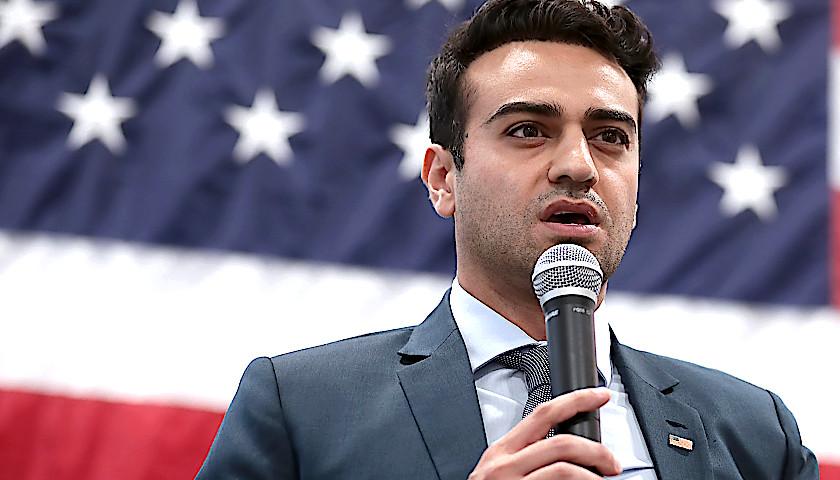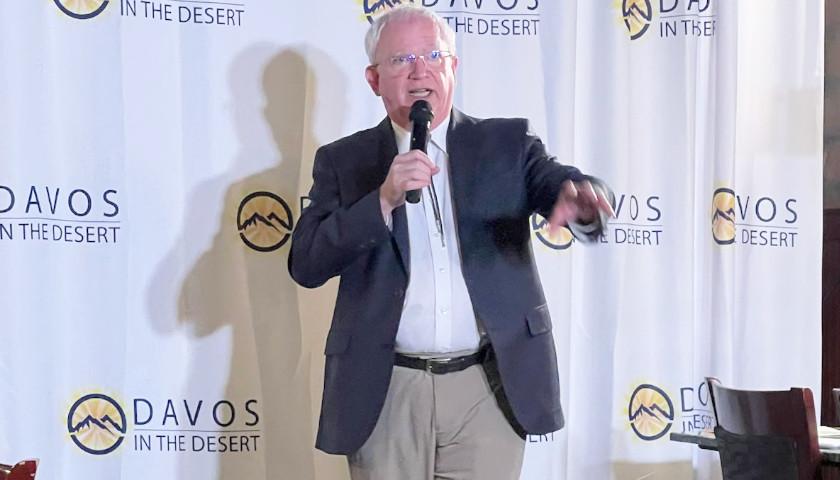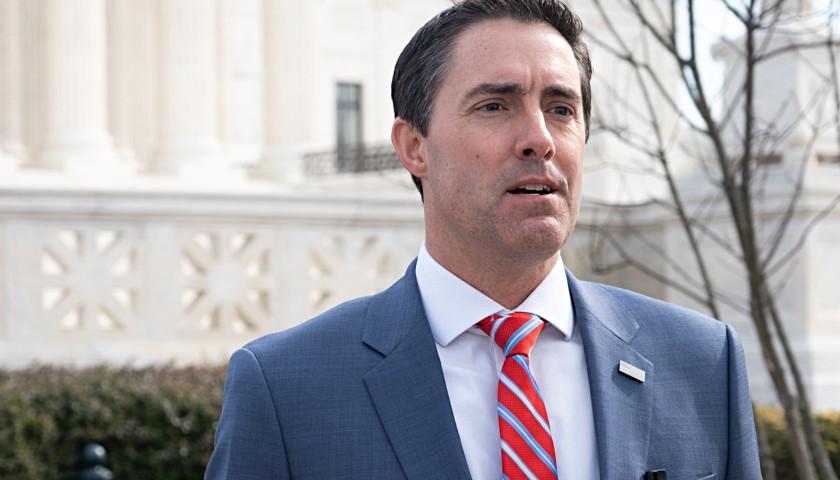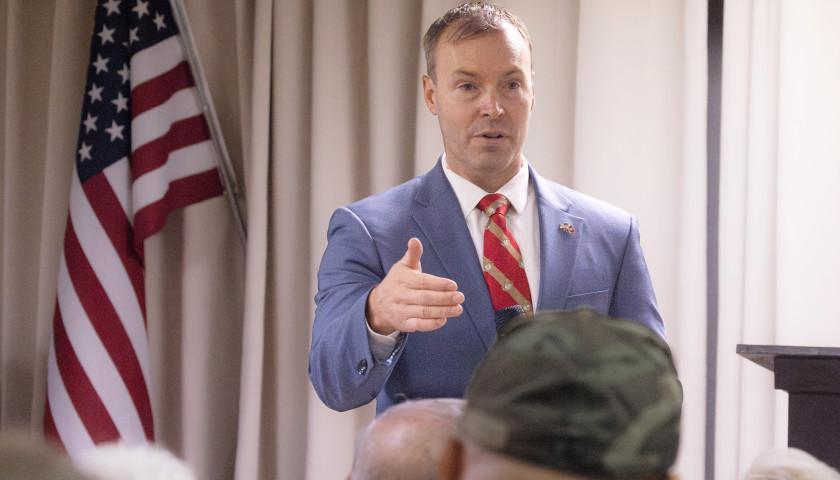Abe Hamadeh continues his election litigation challenging his 280-vote loss to Democratic Attorney General Kris Mayes, including filing a Petition for Writ of Quo Warranto to remove Mayes from office. This past week, he filed a response to the Arizona officials’ Motions to Dismiss that lawsuit.
Represented by Ryan Heath of Heath Law, Hamadeh laid out the status of the case in the opening of his 43-page Response. “Respondent Kris Mays, Defendant Fontes, and the Maricopa County Defendants seek to deny Petitioner and many other voters their fundamental rights guaranteed by the Arizona Constitution for the sake of expediency,” he said. “The Maricopa County Defendants also seek to avoid accountability for their failures, which plausibly resulted in thousands (and likely hundreds of thousands) of illegal votes affecting the results of the 2022 General Election for the office of Attorney General (the ‘Contested Race’). Due to Maricopa County officials’ lack of candor, the circumstances permitting Petitioner to bring this action were not known — and could not have been known — until more than half a year after the official canvass was taken for the Contested Race.’
Hamadeh refuted multiple claims brought up by the defendants Mayes, Secretary of State Adrian Fontes, and Maricopa County officials. First, the defendants argued that Hamadeh’s petition was procedurally flawed, since he didn’t comply with the applicable state statutes, A.R.S. 12-2041 and 12-2043. Mayes asserted that Hamadeh did not give her a “reason to believe” she was usurping the office based on his allegations.
Hamadeh responded and said the statute doesn’t go so far as to require the attorney general to “actually believe;” the standard is “reasonably conclude.” He cited Buggeln v. Doe, where the Arizona Supreme Court stated, “It is … [her] duty to bring such proceedings when facts are laid before [her] from which [s]he can reasonably conclude that such franchise is being usurped.”
Regardless, he noted that A.R.S. 12-2043 states that if the attorney general declines to bring a quo warranto action when requested by a person, the person may then bring the action themself in court, which Hamadeh is doing.
Second, the defendants claimed that Hamadeh allegedly “does not ask to be installed as Arizona’s Attorney General” and “does not plead that he won by an exact number of votes with any mathematical certainty.” Hamadeh showed where he asked in his complaint to be installed as the attorney general, and that the standard to survive a motion to dismiss does not require a showing of “mathematical certainty.” He cited a holding by the Arizona Supreme Court in Kari Lake’s election lawsuit, which did not require that level of certainty. Instead, the court said her complaint survived a motion to dismiss by alleging that “votes were affected in sufficient numbers to alter the outcome of the election based on a competent mathematical basis to conclude that the outcome would plausibly have been different.”
Third, the defendants alleged that the lawsuit is barred by claim preclusion, which means the issue has already been litigated — in this case a lawsuit filed by the Republican Party over signature verification procedures. Hamadeh responded citing Phx. Newspapers v. Dep’t of Corr., pointing out that the quo warranto lawsuit alleges both new facts and a new theory of law.
“The Newspapers court held, as a matter of law, that claim preclusion did not bar the second suit because the ‘Newspapers assert[ed] a new theory in their second action, supported by some additional facts,’” Hamadeh explained. His lawsuit, unlike Lake’s lawsuit, alleged that election workers did not comply with the state’s Election Procedures Manual and that “Maricopa County violated provisions of the Arizona Constitution by deviating from ‘non-technical’ laws.”
Fourth, the defendants asserted that the lawsuit is barred by issue preclusion, repeating similar accusations about claim preclusion. Hamadeh responded, “[T]his case is not a challenge to the validity of the EPM. Rather, this suit contends that Maricopa County failed to follow the clear provisions of the EPM because the EPM does not allow vote-by-mail-affidavit signatures to be incorporated into the ‘registration record.’”
Fifth, Hamadeh pointed out how the defendants’ motions to dismiss failed to “address the most critical issue in this case,” which is that state law and the EPM do not allow election workers to compare voters’ signatures on mail-in ballot affidavits to any previous signatures other than their original voter registration signatures. Yavapai Superior Court Judge John Napper, in Arizona Free Enterprise Club v. Fontes, ruled in September that not using voters’ original signatures as required by statute on their voter registrations to compare their ballot affidavit signatures to was illegal.
Sixth, the defendants claimed that Hamadeh’s lawsuit was a post-election challenge to an election procedure that was known to him prior to the election. They said the county’s Election Plan for the 2022 election allowed them to use other signatures for verification. However, Hamadeh responded and pointed out that the plan “does not specify whether previously-verified signatures from voting affidavits from previous elections were from in-person affidavit envelopes — which are “registration” records — or vote-by-mail affidavit envelopes — which are not.” Using the latter did not violate the law, so Hamadeh was not on notice that the county intended to violate the law.
Seventh, the defendants said the lawsuit was an election contest, so it was filed too late, citing A.R.S. 16-673. Hamadeh responded and said it isn’t, since it was not merely challenging “alleged statutory violations,” but also asserting a constitutional challenge. He said to apply the election contest to his type of challenge would violate the Arizona Constitution, since “information giving rise to Petitioner’s constitutional claims was concealed for more than half a year after the Contested Race by county elections officials.” Hamadeh said his “constitutional rights regarding the fairness, purity, and legitimacy of elections” outweigh the time constraints of state statutes, citing case law.
Eighth, Hamadeh refuted the defendants’ claim that laches barred the lawsuit. The doctrine of laches applies to prevent lawsuits where “the plaintiff unreasonably delayed in filing the action and the delay caused prejudice to the defendant or the administration of justice,” he said, citing the 2020 Arizona case Bowyer v. Ducey. The “delay was reasonable because the basis for this suit was neither known before Election Day nor soon thereafter,” and the defendants weren’t prejudiced since the “delay was reasonable,” he asserted.
The defendants said mandamus relief wasn’t warranted since the election contest statutes already provide relief. Hamadeh responded and said they weren’t applicable, since the lawsuit wasn’t seeking to challenge the election results, but to remove Mayes from office through a quo warranto action.
Finally, the defendants claimed that sanctions against them weren’t warranted. Hamadeh said they were justified against Mayes and her attorneys because of their “blatant misrepresentations.” Mayes claimed that Maricopa County’s signature verification procedures were the same as other counties, but the other counties “do not accept ballots for tabulation in their canvasses based on an exclusive comparison to a previously verified vote-by-mail affidavit signature.”
Additionally, Mayes claimed that Maricopa County Superior Court Judge John Hannah recently ruled in Lake v. Richer that the “ballot affidavit envelopes are ‘voter registration records’ in the Arizona election process as it currently exists.” Hamadeh said this wasn’t accurate; the judge was addressing a different issue. Hannah clarified, “That issue is not before the Court in this case. It requires interpretation of a different statute (A.R.S. section 16 550) that addresses a different issue (election administration) and uses different terminology (‘registration record’) that could well mean something different than the statutory language at issue here.”
The case is assigned to Maricopa County Superior Court Judge Susanna Pineda, who was appointed to the bench by Democratic Governor Janet Napolitano. Hamadeh filed a lawsuit in November against Maricopa County demanding decertification of the 2022 election in the attorney general’s race. In October, he filed his opening brief with the Arizona Court of Appeals appealing the trial court’s refusal to grant him a new trial despite uncovering new evidence of undervotes that led to him receiving more votes, that was withheld from him by then-Secretary of State Katie Hobbs.
– – –
Rachel Alexander is a reporter at The Arizona Sun Times and The Star News Network. Follow Rachel on Twitter / X. Email tips to [email protected].
Photo “Abe Hamadeh” by Gage Skidmore CC2.0.








